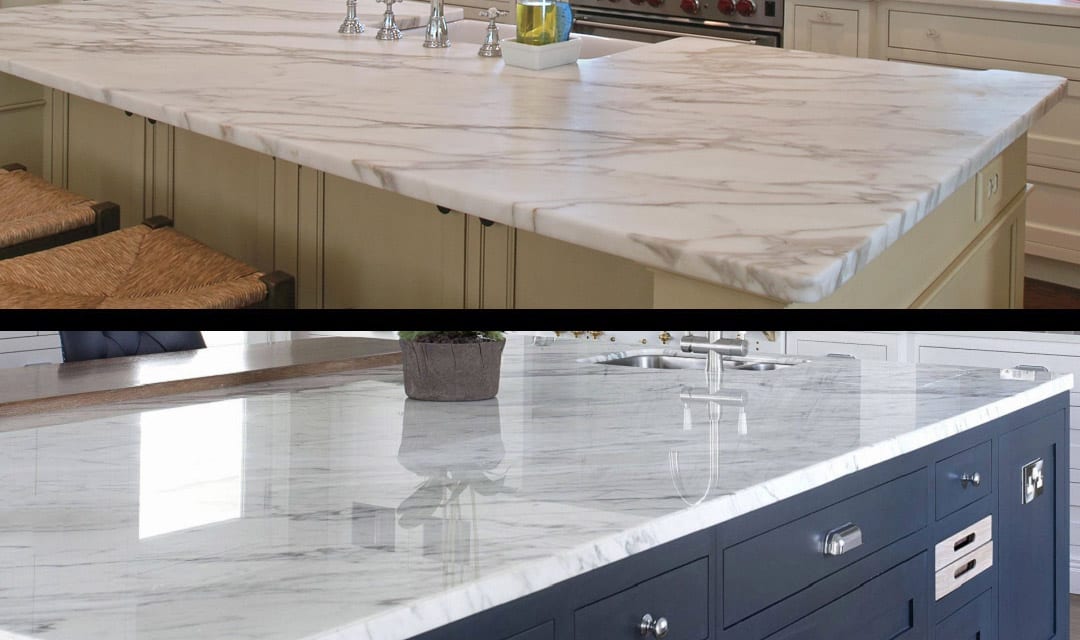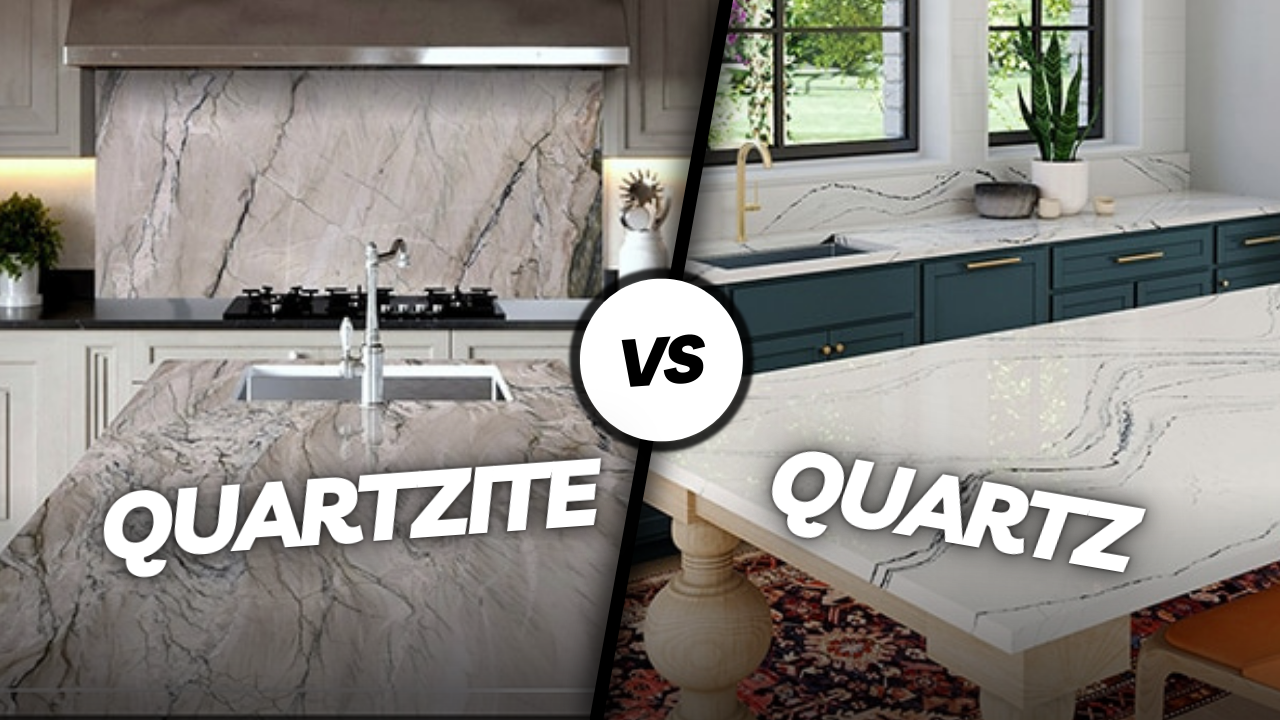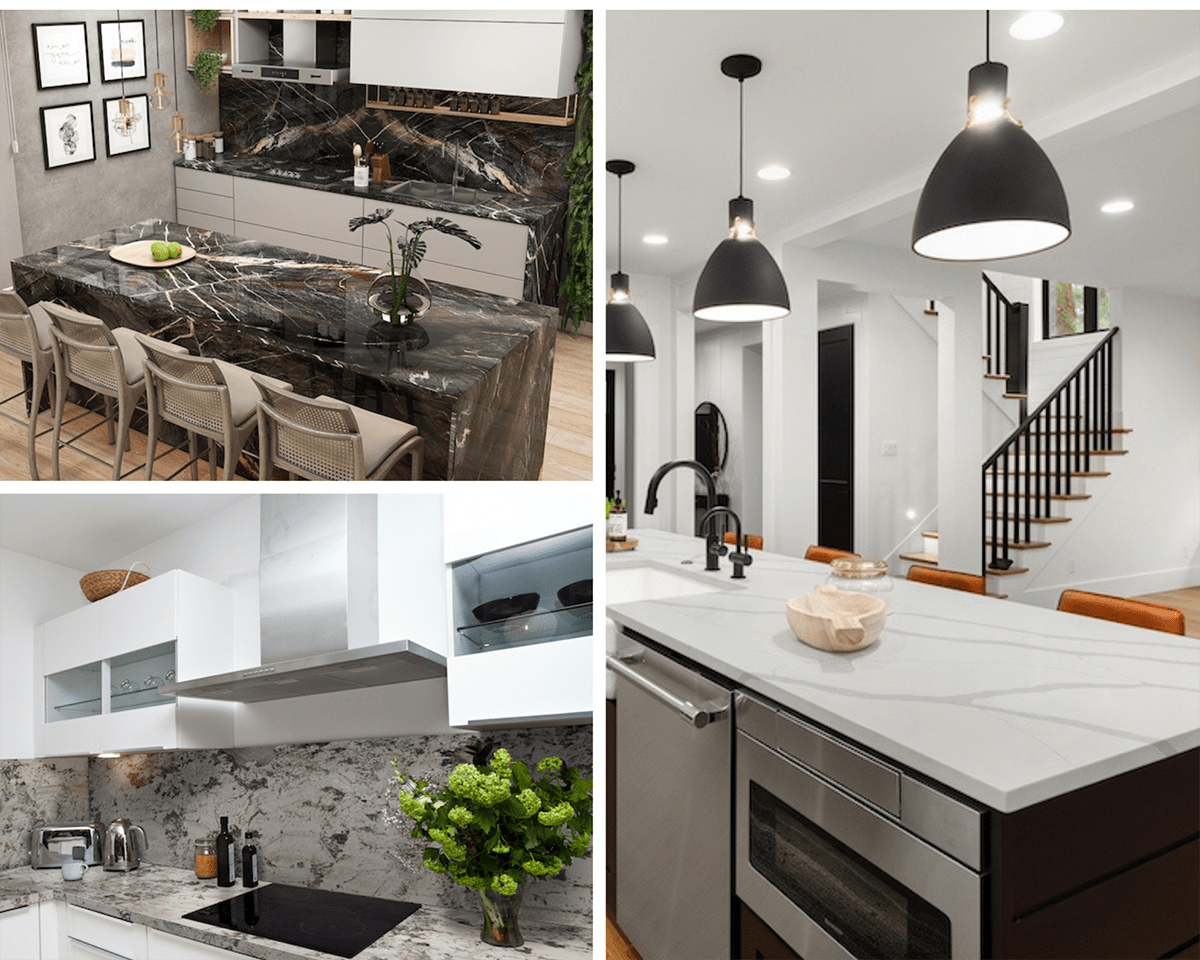Quartz is the better option when choosing between quartz and quartzite countertops due to its durability and lack of porosity. Quartzite requires sealing to maintain its strength and luster over time.
Quartz countertops are sealed and mixed with materials that eliminate porosity, making them more complicated and durable than quartzite. On the other hand, natural quartzite is porous and needs to be sealed to preserve its quality. Quartz is the mQuartzactical choice for homeowners looking for long-lasting, low-maintenance countertops.

Understanding Quartz
Quartz is famous for countertops due to its durability and stunning appearance. It is an engineered stone made from natural Quartz and ResiQuartzis. Its unique composition provides numerous advantages, making it a desirable option for many homeowners.
Composition
Quartz comprises approximately 90–93% natural quartz crystals and 7–10% resins and pigments. This engineered mixture allows for greater consistency in color and pattern and improved strength and durability.
Advantages
Quartz countertops offer several advantages that make them stand out among other countertop options. These advantages include:
- Strength and Durability: Quartz countertops are highly resistant to scratches, stains, and heat. They are also less likely to chip or crack than natural stone countertops.
- Low Maintenance: Unlike natural stone countertops, quartz does not seal. It is easy to clean and maintain with regular soap and water.
- Wide Range of Colors and Patterns: Quartz countertops come in various colors and patterns, allowing homeowners to find the perfect match for their kitchen or bathroom design.
- Hygienic Surface: Quartz countertops are non-porous and do not harbor bacteria or germs. This makes them a clear choice for food preparation areas.
Disadvantages
While quartz countertops have many advantages, there are a few disadvantages to consider:
- Not Completely Heat-Resistant: Quartz is heat-resistant but not entirely heat-proof. Placing hot pans directly on the surface can cause damage.
- Not as Natural-Looking: Some homeowners prefer the natural beauty and unique veining of natural stone countertops. Quartz, being an engineered stone, may not provide the same natural look.
Understanding quartz countertops’ composition, advantages, and disadvantages is essential when deciding which countertop material best suits your needs. Considering these factors will help you make an informed choice that aligns with your design preferences and lifestyle.

Understanding Quartzite
Quartzite is a natural stone that has gained immense popularity as a countertop material due to its unique characteristics. Understanding quartzite’s composition, advantages, and disadvantages is essential for making an informed decision when choosing between quartz and quartzite countertops.
Composition
Quartzite is formed from sandstone that undergoes intense heat and pressure beneath the earth’s surface. This process causes the sand grains to recrystallize, creating a dense and durable stone. The composition of quartzite primarily consists of quartz grains, giving it a high silica content and a similar appearance to marble.
Advantages
Quartzite offers numerous advantages as a countertop material, making it a preferred choice for many homeowners:
- Durability: Quartzite is highly durable and resistant to chips, scratches, and heat. It can withstand the wear and tear of daily kitchen activities.
- Natural Beauty: With its unique patterns and veining, quartzite adds a touch of elegance and sophistication to any kitchen or bathroom.
- Wide Range of Colors: Quartzite is available in various colors, from subtle whites and grays to bold blues and greens, allowing homeowners to find the perfect match for their aesthetic preferences.
- Low Maintenance: Unlike some other natural stones, quartzite requires minimal maintenance. Regular sealing can prolong its lifespan and protect it from stains.
Disadvantages
Although quartzite offers many advantages, there are some drawbacks to consider:
- Porosity: Quartzite is a porous stone susceptible to staining if spills are not promptly wiped up. Regular sealing is necessary to maintain its resistance to liquids.
- Etching and Scratching: Quartzite is more prone to etching, scuffing, scratching, and staining than granite. Acidic substances like orange juice, vinegar, and household cleaners can cause etching.
Understanding quartzite’s composition, advantages, and disadvantages is crucial in deciding whether it is the right choice for your countertops. While it offers beauty, durability, and a wide range of colors, it requires regular sealing to maintain its resistance to stains and proper care to prevent etching. Considering these factors, you can decide which countertop material is most suitable for your home.
Comparison Between Quartz And Quartzite
Quartz and quartzite are two popular options that often confuse homeowners when choosing the perfect countertop material for their kitchen or bathroom. While both of these materials offer unique benefits, it is essential to understand the differences between them to make an informed decision. In this article, we will compare quartz and quartzite in terms of durability, heat resistance, and maintenance.
Durability
Durability is one of the most important factors when choosing a countertop material. In this regard, Quartz takes Quartz. Quartz is an engineered stone that combines natural quartz crystals with resins and pigments. This manufacturing process results in a highly durable, non-porous surface that can withstand tears. Quartzite is a natural stone formed from sandstone and quartz under high temperatures and heat. Quartzite is also durable but less resistant to scratches and chips than quartz. It is important to note that proper care and maintenance can enhance the durability of both materials.
Heat Resistance
Regarding heat resistance, both quartz and quartzite have their advantages. Quartz, being an engineered stone, is designed to withstand high temperatures. It is heat-resistant and can handle hot pots and pans without damage. However, direct contact with extreme heat sources, such as hot pans or cooking appliances, should be avoided to prevent potential damage. Quartzite, on the other hand, is a natural stone with inherent heat-resistant properties. It can handle moderate heat without any issues. To be on the safe side, it is always recommended to use trivets or hot pads when placing hot items on quartzite countertops.
Maintenance
In terms of maintenance, Quartz has the Quartz Hand. Quartz countertops are non-porous and do not require any sealing. They are stain-resistant and easy to clean with just mild soap and water. On the other hand, quartzite is a porous material and requires regular sealing to prevent staining and maintain its durability. It is important to note that the frequency of sealing depends on the specific type and usage of quartzite countertops. It is recommended to consult with your countertop supplier or installer for the best sealing schedule.
Choosing between quartz and quartzite countertops depends on your preference, budget, and specific needs. Quartz is ideal if you prioritize durability, heat resistance, and low maintenance. However, suppose you appreciate the natural beauty and unique veining of quartzite and are willing to invest in regular sealing and maintenance. In that case, quartzite may be the perfect option.
Choosing The Right Countertop
When choosing the right countertop, it’s essential to consider the differences between quartz and quartzite countertops. Quartz is sealed and more durable, while natural quartzite is porous and requires sealing to maintain its strength and appearance.
Considerations
When choosing the right countertop for your home, it’s essential to consider a few key factors. First, consider your lifestyle and how you plan to use the countertop. Are you an avid cook who spends a lot of time in the kitchen? Or do you prefer a low-maintenance option that requires minimal upkeep?
Next, consider the overall aesthetic you want to achieve in your space. Quartz and quartzite come in a wide range of colors and patterns, so take the time to explore different options and find the one that best complements your kitchen or bathroom design.
Finally, consider your budget. While quartz and quartzite countertops can vary in price, choosing a material that fits your budget without compromising quality and durability is essential.
Price Comparison
When comparing prices between quartz and quartzite countertops, it’s important to note that quartz is more affordable than quartzite. Quartz is an artificial material, while quartzite is a natural stone that requires more processing and fabrication.
However, it’s essential to consider the long-term costs as well. While quartz may have a higher upfront price, quartzite countertops are known for their durability and resistance to scratching and staining. This means quartzite may require fewer repairs and replacements over time, potentially saving you money in the long run.
Suitability For Different Settings
Quartz and quartzite countertops have different properties, making them better suited for specific settings. For example, Quartz is non-quartz and highly resistant to staining, making it an excellent choice for busy kitchens where spills and messes occur daily. Additionally, Quartz is available in various colors and patterns, making it a versatile option for any design style.
On the other hand, quartzite is a natural stone that offers a unique and luxurious look to any space. It is heat-resistant and durable, making it an excellent choice for outdoor kitchens or areas with high heat and humidity. However, it’s important to note that quartzite is more prone to etching and scratching than Quartz, so extra precautions should be taken to protect the surface.

Frequently Asked Questions Of Which One To Choose: Quartz Vs. Quartzite Countertops
Should I get Quartz or quartzite?
Quartz is sealed and more durable than quartzite, which is porous and requires sealing. Choose Quartz for rugged durability.
Which costs more: Quartz or quartzite?
Quartz is generally more expensive than quartzite.
What are the disadvantages of quartzite?
Quartzite has a few disadvantages: it is more prone to etching, scuffing, scratching, and staining than granite. It requires sealing to maintain its strength and luster. Kitchen acids, household cleaners, and liquids like grape juice and coffee can cause damage if not wiped up immediately.
What Countertop Is Better Than Quartz?
Granite countertops are better than quartz. They are aesthetically durable and beautiful, making them the go-to choice for most kitchen remodels.
Conclusion
When it comes to choosing between quartz and quartzite countertops, it ultimately depends on your preferences and needs. Quartz is a non-porous artificial stone that requires no sealing, making it harder and more durable. On the other hand, natural quartzite is porous and needs sealing to maintain its strength and luster.
Both options have advantages and disadvantages, so it’s essential to consider factors such as maintenance, durability, and cost. Ultimately, the best choice for your home will depend on your specific requirements.

Hi, I’m Esrat, and I’m so glad that you found me here at Happy Food Kitchen! I started Happy Food Kitchen in 2023 to have a creative, right-brained outlet to balance my very left-brained career in genetics.




